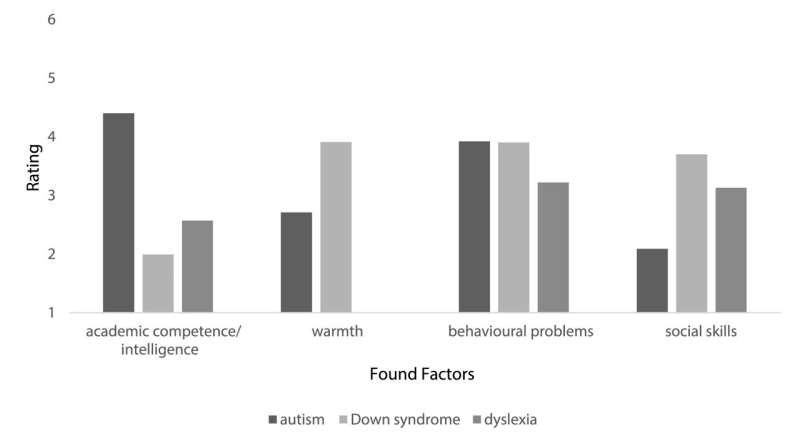This article has been reviewed according to Science X's and . have highlighted the following attributes while ensuring the content's credibility:
fact-checked
proofread
Investigating the stereotypes pre-service teachers associate with pupils with special educational needs

In the course of inclusion, teachers are increasingly instructing pupils with special educational needs. Stereotypes regarding these children and adolescents can influence how the teachers deal with them. The DIPF | Leibniz Institute for Research and Information in Education has now investigated how pre-service teachers imagine autistic pupils and those with Down syndrome and dyslexia.
individual differences between pupils. "It falls short to put all pupils in the same box. They have specific behaviors and abilities that differ greatly from one another. They therefore need individual support," says Schell.
For example, if teachers consider a child to be very intelligent or even highly gifted based on an autism diagnosis, they may overlook their needs and not provide them with enough support. After all, many autistic pupils are not gifted. In turn, if a child with dyslexia is seen as lazy based on stereotypes, teachers may ask them to work harder instead of providing targeted support according to their needs.
The scientific investigation
For their investigation, the DIPF team worked with pre-service teachers who were at different stages of their studies, had taken different subjects and were studying for different school types. In a preliminary study, the researchers first conducted interviews with 13 of these students in which they were asked to name stereotypes that they associate with the groups mentioned. This revealed a broad spectrum of attributions—such as impulsive, unintelligent, but also open or savant.
The researchers incorporated the results of the first study into a standardized questionnaire in order to record the empirical characteristics of the stereotypes in connection with the three groups of pupils. A total of 213 pre-service teachers completed this questionnaire in a larger second study. The strength of the individual attributions was then statistically processed and assigned to overarching categories using factor analysis.
Implications and further research
The studies were carried out as part of the research project "Stereo-Disk—Stereotypes as obstacles for professional diagnostics in an inclusive school context." As part of the project, the DIPF is developing educational programs for teachers to reduce the impact of stereotypes on their assessments of children with special educational needs—for example, seminars that deepen knowledge about the educational needs of individual groups and diagnostic skills. The current studies highlight the need for such programs.
For future studies, the researchers have developed a model on how individual stereotypical attributions can be structured even better. Based on their investigations, they recommend classifying them into the categories "academic competence," "warmth," "social skills" and "behavioral problems."
Schell emphasizes that further research on the topic would be useful. "We looked at the stereotypes only in pre-service teachers and only for three of the pupil groups in particular need of support," says the DIPF researcher. The project team is also currently investigating the effects of stereotypes on behavior in more detail.
More information: Charlotte S. Schell et al, Judging a book by its cover? Investigating pre-service teacher's stereotypes towards pupils with special educational needs, Teaching and Teacher Education (2024).
Provided by Leibniz-Institut für Bildungsforschung und Bildungsinformation



















